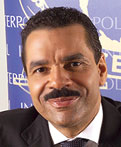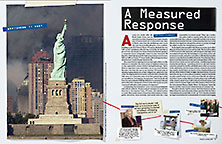 In 2000, Ronald Noble took a leave of absence from the NYU School of Law to assume the leadership of INTERPOL. As secretary general of an international police organization that serves 187 countries, Noble has stressed the need to give police more prominence in the global fight against terrorism. He laid out his vision in a speech, “Confronting the Terrorist and Transnational Crime Challenges of the 21st Century: Are We Prepared?” at the Law School’s Hoffinger Criminal Justice Colloquium last January.
In 2000, Ronald Noble took a leave of absence from the NYU School of Law to assume the leadership of INTERPOL. As secretary general of an international police organization that serves 187 countries, Noble has stressed the need to give police more prominence in the global fight against terrorism. He laid out his vision in a speech, “Confronting the Terrorist and Transnational Crime Challenges of the 21st Century: Are We Prepared?” at the Law School’s Hoffinger Criminal Justice Colloquium last January.
“We must move from a predominantly military-led approach to fighting terrorism to one that employs all components—diplomacy, military, intelligence, and policing—with equal vigor,” said Noble, who served as undersecretary of enforcement for the U.S. Treasury from 1993 to 1996. In that job he oversaw the Secret Service, Customs Service, and the Bureau of Alcohol, Tobacco and Firearms. Taking issue with the phrase “war on terror,” Noble argued that such terminology skews counterterrorism too far in the direction of military solutions “using soldiers, weapons, and combat strategies. Wars have clearly defined opponents and objectives, but this does not apply to al Qaeda, which is neither a state nor a nation, but instead a decentralized network of individuals.”
A major weapon in INTERPOL’s arsenal for tracking and neutralizing criminal networks is its collection of databases that allow the law enforcement community to connect tips and clues around the world. INTERPOL manages a library that recently included 94,000 sets of fingerprints, 88,600 DNA profiles from 50 countries, and information on 12,400 persons suspected of being linked to terrorist activities. It also maintains the only global stolen and lost travel documents database, whose 18.6 million documents shared by 145 countries are queried more than five million times per week. How the information is used is ultimately important. Despite numerous terrorist plots that have involved fraudulent passports, only 51 countries systematically screen travel documents at their ports; the U.S. joined that group only recently.
Noble made the case that law enforcement across the globe must occupy a larger role in counter terrorism. “One reckless murder or the destruction of property is a police matter,” he said. “So, too, mass murder and mass destruction are police matters, not because of an abstract categorization but because we, the police, have the tools, the experience, the mindset, and the determination to investigate and solve these sorts of crimes and, at times, to prevent them from happening again.”
Noble, who teaches criminal law to LL.M. students in the NYU@NUS Singapore Program, raised the question of whether, given the current global financial crisis, counterterrorism and combating other transnational crimes could remain a top priority for the U.S. and other nations. But, he argued, neglecting those issues also has a financial impact: “Unless our citizens and businesses are secure physically and feel secure psychologically, there can be no solid and sustained economic development or recovery. Just one major international terrorist attack against the U.S. or its allies could push us even deeper into a worldwide recession.”
In the end, Noble concluded, everyone in the counterterrorism world has an important function: “Please don’t think that the military only or diplomacy alone will solve the problem, and please don’t think that the intelligence community can do it alone.” Rather, he says, effective counterterrorism requires a concerted effort in which law enforcement has an essential role to play.
—
